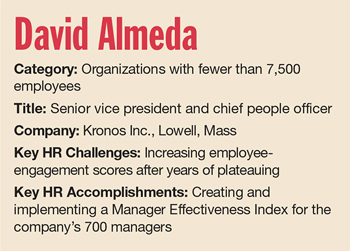This article accompanies This HR Executive of the Year is Transforming IBM.
It took Kronos Inc. more than 30 years to reach $600 million in revenue, a milestone it hit in 2009. But since David Almeda joined the workforce-management-software company in 2010 as its chief people officer, revenues have more than doubled to over $1.3 billion.
“That is no accident,” says Kronos CEO Aron Ain, “and can be directly attributed to the work Dave and his HR team have accomplished.”
While certainly there are myriad factors that contributed to the company’s bottom-line success during that time, Ain calls Almeda the “key architect” behind driving employee-engagement scores from the mid 60s to an all-time high of 87 percent. “In my view, this has been the single greatest contributor to our success over the past 10 years,” Ain says, “directly impacting our ability to create great products and deliver exceptional services for our customers.”
It is heady praise such as this that landed Almeda a spot on this year’s HR Honor Roll, but it focuses on just one aspect of his tenure with the company.
Indeed, in addition to the rollout of an unlimited PTO program in 2016, a laundry list of new benefits also helped raise engagement scores, including: student-loan-repayment assistance, enhanced maternity leave with a brand new parental-leave program for births and adoptions for both moms and dads, childcare-financial assistance, adoption assistance, an increased 401(k) match for employees with five or more years of tenure, an annual scholarship program for 20 children of Kronos workers and enhanced short-term disability at 100 percent.
But it is his team’s creation of a Manager Effectiveness Index–which Ain believes “will help take Kronos to heights we’ve never seen before”–that Almeda seems most proud to talk about.
Building the Index
It all began after the rise in engagement scores, when Almeda started focusing on managers with the aim of “bringing their capabilities up.”
“The reason for the Manager Effectiveness Index was to institutionalize and put in clear accountability for managers,” Almeda says. “Up until that point, all we did was set a bar and draw a line in the sand relative to what we expected managers to do and how we expected them to act.”
The MEI “hardwired” that accountability across the organization and ensured all managers were measured with the same yardstick, he says. “And it gave us a way to determine which managers we needed to focus on to get them to do what we wanted them to do.”
Through performance reviews, leadership-goal ratings, focus groups and the company’s Courage to Lead award nominations–combined with external benchmarking with organizations such as Google, Facebook and Deloitte–Almeda’s team isolated four behaviors the best leaders share: communicating openly and honestly; empowering and enabling; developing and encouraging; and supporting the whole person.
Using those values, Almeda’s team recrafted the company’s biannual employee survey to include 16 areas for managers to be rated on, such as: “My manager makes an effort to get the opinions and thinking of the people in our workgroup,” and “My manager regularly shares relevant information from his/her manager and functional leadership.”
Once Kronos’ 700 managers receive their scores, they meet with their own managers to develop a plan to address any shortcomings, followed by a meeting with their team to discuss implementation of that plan.
“The MEI gives us another layer of important visibility into what effectiveness really means,” Almeda says. The index has already proven its worth, he adds, pointing to a 3-point increase in engagement scores in the past year alone. Almeda’s own MEI score is 99 percent, as evaluated by his direct reports. Meanwhile, the HR team’s overall engagement score, at 94 percent, is higher than the Kronos global average.
Investing in People
But running a highly regarded HR department means dealing with the occasional departure, such as two high performers who were recently lured away with VP roles in HR and talent management.
“You have to expect that,” Almeda says. “But every time someone leaves, it’s an opportunity to repurpose resources. And people come to [us] proactively, saying they’d love to be a part of [our] team, so there’s a plus to it as well.”
After a recent restructuring, Almeda–who also holds the title of senior vice president–is now one of three people who reports directly to the CEO, adding that he gets between two and three hours of face time with his boss every week.
“There are not a lot of CEOs who give you that kind of mission and encouragement,” he says.
So which figure is he more proud of: Kronos’ $1.3 billion in revenue or its all-time high employee-engagement score of 87 percent?
“I don’t know that I could separate those two,” he says. “I’m most proud of the fact that people get the connection between the two. HR has become a center of investment for the business, not just something you need to do to administratively maintain the business.”
As for the accolades that come with the work, Almeda says being named to the HR Honor Roll is “a team award.”
“The best thing I contribute sometimes,” he says with a laugh, “is to get the hell out of the way.”
No one would disagree with that statement more than Almeda’s boss.
“As CEO, I frankly receive too much credit for our success and for being known as a great place to work around the world,” Ain says. “The real hero of our performance has been our HR department and their leader, David Almeda. He has made HR a strategic asset for our business, and he continues to teach me so much every single day.”

